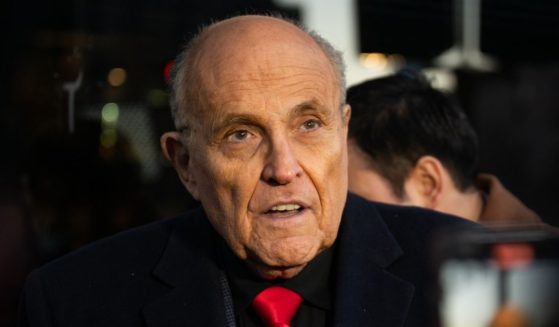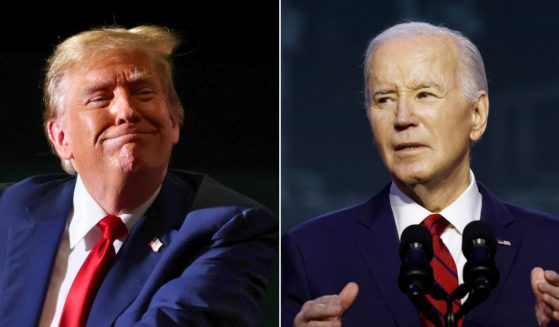NYT Claims Journalists Faced 'Darkest Year' in 2019 Under Trump, Fails To Mention Zero Were Jailed
The New York Times is being taken to task for a recent report claiming 2019 was “the darkest yet for journalists in the Trump era.”
The Monday piece in The New York Times spent much of its time totaling the number of times President Donald Trump said “fake news” this year (273, if you are counting).
It bemoaned the lack of daily media briefings and that White House press secretary Stephanie Grisham prefers to speak to Fox News.
The report also sought to tar Trump with restrictions on the media abroad.
“Mr. Trump’s vilification of the news media is a hallmark of his tenure and a jagged break from the norms of his predecessors: Once a global champion of the free press, the presidency has become an inspiration to autocrats and dictators who ape Mr. Trump’s cry of ‘fake news,'” The Times claimed.
The Times quoted Joel Simon, executive director of the Committee to Protect Journalists, as claiming that at least 30 journalists were jailed last year and charged with false reporting.
“We view that as governments around the world taking advantage of the Trump ‘fake news’ framing and using that as a pretext of imprisoning journalists,” Simon said.
“The dissemination of that rhetoric has only increased in the last 12 months. It’s having a very negative effect.”
But there was a flaw in the argument, as reported by The Daily Caller, which noted that there is not one American journalist imprisoned in what The Times portrayed as the epicenter of attacks on the media.
The Committee to Protect Journalists compiled a report of journalists imprisoned in 2019.
The scorecard showed the U.S. with no journalists behind bars out of the 250 reported jailed around the world, a fact that was not mentioned by The Times in its condemnation of Trump.
Joe Concha, a reporter for The Hill, also pushed back on the verdict delivered by The Times.
In a Thursday interview on the Fox News morning program “Fox & Friends,” he said he “profoundly disagreed” with The Times report.
Concha said former President Barack Obama’s administration “rejected more FOIA requests — Freedom of Information Act requests — than any other administration.”
“I don’t remember The New York Times talking about how that was a dark time for journalists because they agreed with the administration that was in power at that time,” he said.
Trump is often available to journalists in ways past presidents were not, Concha argued.
“We always hear how President Trump is a big threat to journalists and reporters,” Concha said. “He has taken more questions directly from reporters than Obama, Bush, Clinton, Bush Sr., Reagan.”
“How is he a threat, therefore, if you’re speaking to the man himself?”
According to Concha, Trump is exercising his right to push back against a media that covers him “at a clip of 92 percent, 93 percent negative.”
“It’s not just that the reporting is negative, it has become obviously hostile,” he said. “So when he criticizes them back … he is exercising his First Amendment right.”
“He has every right to criticize the press,” Concha concluded.
After reading The Times piece, Clay Waters, writing for NewsBusters, said its bottom line was, “Criticize the media, and you’re threatening the freedoms and lives of journalists.”
“One doesn’t have to condone Trump’s ‘enemy of the people’ language to see the illogic in blaming Trump for everything bad that happens to journalists worldwide,” he wrote.
Others noted that it is the media, not Trump, that needs to reform.
“It is the time of year for New Year’s resolutions and nobody is in need of reform more than the executives who run the big media news outlets,” Jeffrey M. McCall wrote in an Op-Ed on CNS News.
“Unsurprisingly, the news-consuming public has generally lost confidence in the journalism industry. Journalists are supposed to serve as surrogates of the citizenry, serving the information needs of a democracy. Instead, the news industry is now viewed as more interested in riding ideological high horses than serving its mission,” he wrote.
“The news media stumbled through a series of high profile blunders during 2019, beginning last January with frenzied and misdirected coverage of the Covington Catholic high school students in Washington,” he added. “The news industry was then snookered by Jussie Smollett, giving the Smollett story way too much time and space, and failing to scrutinize a situation that had ‘dubious’ written all over it.”
“The media hyperventilated over the Mueller investigation for the first several months of 2019, trying to anticipate what Mueller would find, even though there were basically no facts on which to base such speculation. When the Mueller report at long last surfaced, without the bombshell affirmation of Trump-Russia collusion, the media lost interest and stepped away.”
“The year 2020 will provide many challenges for America, with the upcoming general election, divisive cultural issues and dangers abroad. The news industry should consider how it can help inform a nation as it navigates through these challenges, rather than to serve as a hindrance to understanding,” McCall said.
Truth and Accuracy
We are committed to truth and accuracy in all of our journalism. Read our editorial standards.












